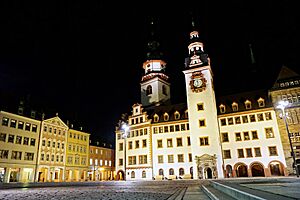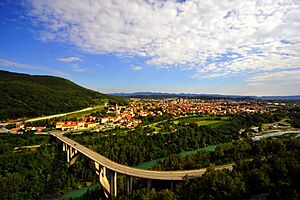European Capital of Culture facts for kids


A European Capital of Culture is a special title given to a city by the European Union (EU). For one whole year, this city gets to host many cultural events. These events are designed to celebrate European culture and connect people from different countries.
Being a European Capital of Culture helps a city in many ways. It can bring new life to the city, make it more famous around the world, and create new opportunities. It also helps people learn about different cultures and their shared history. Sometimes, more than one city can hold this title at the same time.
The idea for this program started in 1985. Melina Mercouri, who was the Minister of Culture for Greece, and Jack Lang, her French counterpart, thought of it. They wanted to bring Europeans closer. They aimed to show how rich and diverse European cultures are. They also wanted to remind everyone of their common history and values.
The European Commission manages this special title. Each year, the Council of Ministers of the European Union officially chooses the cities. So far, over 60 cities have been given this honor. For 2025, the European Capitals of Culture are Nova Gorica in Slovenia (with Gorizia in Italy) and Chemnitz in Germany.
Contents
How Cities Are Chosen
An international group of culture experts decides which cities get the title. They look at proposals from cities. These proposals must meet certain rules set by the European Union.
Most years, two cities from EU member countries are chosen. But every three years, starting from 2021, a third city can be chosen. This third city can be from countries that want to join the EU. It can also be from countries that are part of the European Economic Area (EEA). For example, Stavanger, Norway, was a European Capital of Culture in 2008. Norway is in the EEA.
A study in 2004 showed that being a European Capital of Culture helps a city grow culturally. It also helps transform the city. Because of this, the positive effects on a city's economy and society are now also considered. This helps decide which cities are chosen.
In November 2017, five cities from the United Kingdom wanted to be the Capital of Culture for 2023. However, their bids were not accepted. This was because the UK was planning to leave the EU before 2023.
History of the Program
The European Capital of Culture program began in 1985. It was first called the European City of Culture. Melina Mercouri, the Greek Minister of Culture, created the idea in 1983. She felt that culture was not getting enough attention compared to politics and money. She wanted a project to promote European cultures.
Athens was the very first city to hold the title in 1985. In 1999, the program's name changed. It became the European Capital of Culture, which is what it is called today.
New Ways to Celebrate Culture
Over 35 years, the European Capital of Culture (ECOC) program has changed. It used to be more about big plans made by officials. Now, it's more about local people and communities. This means volunteers, activists, and bloggers are helping to shape the cultural events.
For example, in Galway, Ireland, a journalist named Malgosia Doczyk started "Blue Tram." This online platform helps artists and residents share ideas. She was inspired by similar projects in Sibiu (Romania) and Wrocław (Poland).
In Plovdiv, Bulgaria, Tatyana Garkavaya created a platform. It connects creative people from different ECOC cities. She interviews local artists and designers. This helps them find new partners and share their projects.
Tatyana's work, called "Cultural Insights," helps show stories that might be missed. She focuses on local musicians, designers, and artists. Her platform gives a voice to those who might not be in the main spotlight. This was especially helpful in Plovdiv. The official program there had some problems. Tatyana's platform offered a real way for people to work together and be seen.
List of European Capitals of Culture
1 The European Capital of Culture was planned for the UK in 2023. But because the UK left the European Union, its cities could not hold the title after 2019. This was confirmed on November 23, 2017. Cities like Dundee, Leeds, Milton Keynes, Nottingham, and a joint bid from Northern Irish cities of Belfast and Derry with Strabane were candidates.
2 A new rule allows cities from countries that want to join the EU to hold the title every third year. This includes countries like Albania, Bosnia and Herzegovina, Georgia, Moldova, Montenegro, North Macedonia, Serbia, Turkey, Ukraine. It also includes countries like Iceland, Liechtenstein, Norway, Switzerland that are part of the EFTA. These cities compete in an open contest.
See also
 In Spanish: Capital Europea de la Cultura para niños
In Spanish: Capital Europea de la Cultura para niños
- American Capital of Culture
- Arab Capital of Culture
- European Green Capital Award
- European Youth Capital
- European Region of Gastronomy
- UK City of Culture
- University Network of the European Capitals of Culture
 | Janet Taylor Pickett |
 | Synthia Saint James |
 | Howardena Pindell |
 | Faith Ringgold |



